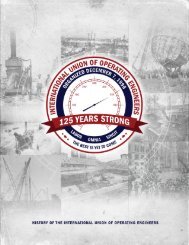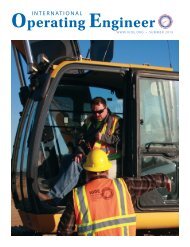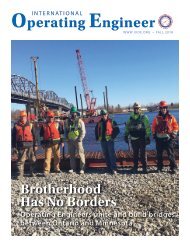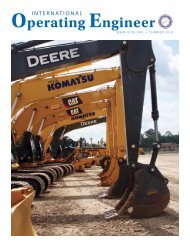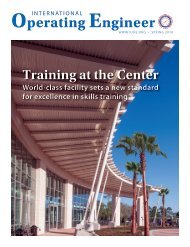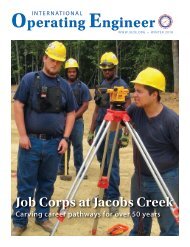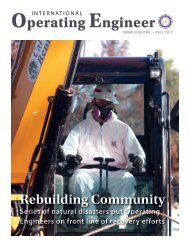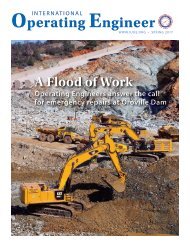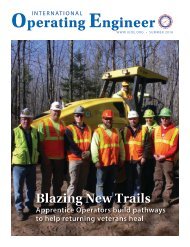International Operating Engineer - Spring 2016
The quarterly magazine of the International Union of Operating Engineers.
The quarterly magazine of the International Union of Operating Engineers.
Create successful ePaper yourself
Turn your PDF publications into a flip-book with our unique Google optimized e-Paper software.
Healthcare<br />
IUOE Nurses Keep Up the Fight for Patient Rights<br />
and Worker Rights<br />
IN APRIL, more than 200 JNESO District Council 1<br />
health care workers gathered for their biennial convention<br />
in Atlantic City. Members attended seminars on emerging<br />
issues in health care, addressed union matters, and earned<br />
the continuing education units (CEUs) required to keep their<br />
licenses current.<br />
“Every other year, JNESO membership gathers for<br />
our Convention and it demonstrates the strength and<br />
unity of our organization,” said Elfrieda Johnson, Board<br />
President of JNESO District Council 1. “Our successes at the<br />
bargaining table and in the legislative arena are rooted in the<br />
participation and active engagement of our members, and I<br />
am thrilled with the record turnout at this year’s Convention.”<br />
Throughout the four day convention, members discussed<br />
various issues at length. Three priority areas that were<br />
addressed are often inter-related—the need to codify safe<br />
nurse-to-patient staffing ratios; addressing violence in<br />
the workplace; and supporting the expansion of collective<br />
bargaining rights for healthcare workers.<br />
Safe Nurse-to-Patient Staffing Ratios<br />
Representing more than 5,000 health care workers in New<br />
Jersey and Pennsylvania, JNESO has long advocated for safe<br />
nurse-to-patient staffing ratios in hospitals and ambulatory<br />
care centers throughout both states.<br />
In December 2015, nurses and patient advocates took a<br />
step toward legislative victory when safe staffing legislation<br />
was posted for a vote before the New Jersey Assembly Health<br />
Committee. After more than twenty years, this bill was finally<br />
voted upon by a legislative committee, and JNESO nurses<br />
were there to share their first-hand experiences and be a<br />
strong voice for safe nurse-to-patient staffing ratios.<br />
While this was indeed an historic step forward, the fight<br />
for full passage of safe staffing ratios in both state capitals<br />
continues.<br />
Violence in the Workplace<br />
The Occupational Safety and Health Administration<br />
(OSHA) reports that over 2 million American workers are<br />
victims of workplace violence each year. The health care<br />
industry leads all other sectors in the incidence of nonfatal<br />
workplace assaults; particularly in emergency departments<br />
[above] JNESO Board members are sworn in at<br />
convention. L to R: Board President, Elfrieda Johnson,<br />
Board members Valerie-Clary Muronda and Regina<br />
DiSalvio.<br />
and in psychiatric settings. Nurses serve on the frontlines<br />
of health care delivery, and are often the targets of violent<br />
encounters - both verbal and physical. Workplace violence<br />
continues to be a serious occupational risk that requires<br />
targeted responses from employers, law enforcement, the<br />
community, and state legislators.<br />
Collective Bargaining for Health Care Workers<br />
Patients and their families expect nurses and other health<br />
care workers to fight for them at the bedside, even when it<br />
conflicts with the profit motive of hospital administrators,<br />
insurance companies, and others in the health care industry<br />
who put the bottom line above patient interest and safety.<br />
When unionized nurses are fighting for their patients, the<br />
union is fighting for our nurses.<br />
Charles Wowkanech, president of the New Jersey State<br />
AFL-CIO, which represents one million working men and<br />
women and their families, addressed the convention. “Nurses<br />
advocating for patients and safety are doing so because they<br />
have protection from retaliation as unionized nurses. They<br />
are asking for standards on behalf of every patient in New<br />
Jersey, and every nurse and health care worker who cannot<br />
speak up. Their voices need to be heard!”<br />
10<br />
INTERNATIONAL OPERATING ENGINEER<br />
SPRING <strong>2016</strong> 11



